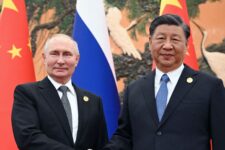
U.S. Marine Corps Gen. David H. Berger, the 38th commandant of the Marine Corps, visits 2d Marine Division on Camp Lejeune, N.C., May 3, 2021. (U.S. Marine Corps Jennifer E. Reyes)
Perhaps no current leader at the Pentagon has stirred up as much passion as Marine commandant Gen. David Berger and his plan to overhaul the Marines, which have been met with significant and at times cutting feedback from retired officers. In this analysis, David E. Johnson of the RAND Corporation calls for peace in the Corps, before it’s too late.
There is a war going on over the future of the Marine Corps.
On one side is Marine Corps commandant Gen. David H. Berger. In opposition is a large, organized group of retired Marine generals. The war is over Berger’s decision to overhaul the Corps to function as an adjunct of the Navy, focused primarily on anti-shipping operations against China.
But if this conflict continues, it threatens to be destructive to the very fabric of the Corps — bad for the Marines and worse for our country. And while both sides feel passionately they are doing what’s best for the service, this conflict needs to be stopped, immediately, before irreparable harm is done.
Berger first announced intentions to reform the Corps in his Commandant’s Guidance [PDF] when he assumed office in July 2019. He also made it clear that addressing force design was his “number one priority.”
The document caused little disruption at the time, given that it was, in Berger’s words, “a road map.” Surely, it was vision statement not an edict, and the actual implementation would be debated rigorously within the Marine Corps family?
RELATED: Marine commandant talks Ukraine, Force Design 2030 controversy
Those who thought this was what Berger was about were wrong. The real war kicked off with the publication of Force Design 2030 in March 2020. Berger’s destination became clear, as did the parts of the Marine Corps that were no longer invited on the trip. He set in motion plans for a radical redesign of the Corps to respond to the strategic imperative of the rise in China; a mission for which he was convinced the Marines are unprepared.
Berger dictated that the Corps would “return to our historic role in the maritime littoral.” He also determined that the current Corps had significant capability shortfalls that were needed to execute this mission. To fill these gaps, he mandated that the Corps would discard all its tanks and significantly reduce current hard-to-deploy systems, e.g., field artillery. These legacy systems will be replaced by missile-equipped forces that will take on the Chinese Navy from dispersed, hard-to-find locations.
The Corps is also dramatically reorganizing its existing structure into Marine Littoral Regiments (MLR). They will be a naval formation, organized around an infantry battalion and anti-ship missile batteries.
Berger and his supporters also argue that the reinvented corps can still execute its traditional missions just as effectively as before. If necessary, it will get tanks and other capabilities from the other services. But ultimately, the MLR is not your father’s Marine regiment — and an older generation of Marines are not happy.
Force Design 2030 had an unintended consequence likely not anticipated by the Commandant. It ignited a revolt of many retired generals. Ironically, Berger’s initiatives have been generally greeted with kudos by many defense analysts and policymakers outside the Marine family. They welcome that at least the Marines, as opposed to the other services, are doing something about China.
The View From the Unprecedented Revolt
The dissenters’ gloves came off in a recent series of articles. That a large group of retired Marines have publicly gone against a commandant’s decision is unheard of in the history of the Corps. Marine officers are known, above all, for their loyalty to the Corps. Semper Fidelis — Always Faithful — is more than a motto; it is a way of life.
Perhaps the most noted early salvo from the opposition was the March commentary in The Wall Street Journal by former senator and Marine officer Jim Webb. Its title is the de facto manifesto of the dissenters: “Momentous Changes in the US Marine Corps’ Force Organization Deserve Debate.”
Webb also wrote that the agonizing decision to go public came only “After several unsuccessful attempts by retired senior officers to engage in a quiet dialogue with Gen. Berger” and the commandant not responding to a nonpublic letter of concern signed by 22 retired four-star Marine generals.
That the dissenters believed that they had to take their grievances outside the family shows how seriously they view the issues at hand. Webb captures their angst quite eloquently: “The traditional deference has been replaced by a sense of duty to the Marine Corps and its vital role in our national security.”
Retired Lt. Gen. Paul Van Riper also weighed in, writing that Berger’s scheme was “for only one type of conflict, despite pronouncements to the contrary: a naval war with China.” Consequently, he and the other dissenters argue that the Corps will be less capable — if not unable — to execute what it has done so well in the past: global combined arms operations. It will also, he argues, cripple the Corps’ ability to serve as America’s emergency force.
RELATED: Racing China, Marines strategy sees sensors, info warfare and mobility as key
Tim Barrick’s “On Future Wars and the Marine Corps,” written to defend Berger’s moves, actually reveals a number of reasons why the commandant may have encountered such strong resistance to his initiatives. First, Force Design 2030 was developed in two months in a “shroud of secrecy” by “a small group of colonels and generals,” noting that “tough trade off choices were required and a sense of urgency regarding China prevailed.” Second, only the commandant’s alternative was assessed.
These are the central issues for those in dissent: A small group, hand-picked by the commandant, set out to validate Gen. Berger’s single institution-changing idea with no rigorous analysis of alternatives or an opportunity for inclusive dialogue about this momentous decision.
Unfortunately, the tone of the confrontation will likely become even more virulent with an update to Force Design 2030 [PDF] now on the streets.
Therefore, it is time to call a truce.
Both sides have valid points that should serve as the basis for dialogue. Berger’s detractors are reacting to what they perceive as a poorly-conceived quest by the Commandant to be relevant in the pivot to Asia with his almost exclusive focus on a naval conflict with China. And yet, Berger is righty cognizant of the urgent need to tend to the significant challenges China poses to our national security.
There is a critical question that needs to be urgently answered: Is the commandant right to largely reorient his service to support a naval fight China, or is a broader (and admittedly more traditional) approach to the Corps future more appropriate?
And at the heart of the split in the service is this: Berger, right or wrong in his assumptions, didn’t do the outreach that traditionally is expected. Radical change of this profound nature should be debated professionally and thoroughly analyzed, not imposed by fiat. Admittedly, good ideas often die a lingering death in the Pentagon. At some point a service chief has to lead and do what is necessary to move forward quickly. But there is some useful middle ground between decree and obstruction that still needs to be plowed with Force Design 2030.
Berger, although he had listening sessions with several of the dissident generals, apparently ignored their recommendations. Like it or not, these retired officers are part of his constituency and they helped build the magnificent Corps he inherited. Their advice should be carefully considered.
The stakes are extremely high. This is not an inconsequential decision, like the Oct. 2000 decision by then-Army Chief of Staff Gen. Eric Shinseki, when he mandated adoption of the black beret throughout the Army and set off a furor. Nor is Force Design 2030 a “New Coke” type of fiasco. Berger’s decision is extremely consequential. He is deciding the future capabilities of an important service to contribute to our national defense, not what kind of headgear Marines will wear or what sodas Americans will like.
Even an old, retired Army colonel like me, although I hate to admit it, realizes that our nation needs a strong and relevant Marine Corps. It is time for the Marine family to have a real sit-down to sort all this out and get the Corps back on track.
David E. Johnson, Ph.D., is a retired Army colonel. He is a principal researcher at the nonprofit, nonpartisan RAND Corporation and an adjunct scholar at the Modern War Institute at West Point. From 2012-2014 he founded and directed the Chief of Staff of the Army Strategic Studies Group for General Raymond T. Odierno.
New tech, including drones carrying blood, help injured Israeli soldiers survive
In a recent tour, Israel Defense Forces showcased new methods and technology that they say has halved the casualty rate for the seriously injured.


























